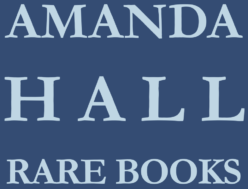The Most General School-Assistant. Containing a complete system of arithmetic: the common and useful problems in practical geometry: the methods used in taking the dimensions of artificers work: mensuration of all kinds and superficies and solids, of artificers work, of timber, and of land: together with guaging [sic], bills of parcels, &c. &c. Exeter, R. Trewman for Robinson & Roberts, London, &c., 1770.
First Edition. 12mo (171 x 102 mm), pp. x, [ii],191, printed on thick paper, woodcut head- and tail-pieces, diagrams and tables throughout the text, some browning in text, wanting the free endpapers, in contemporary sheep, blind ruled border to covers, spine badly chipped at head, joints cracking and weak, extremities rubbed, with the ownership inscription ‘Edward Harper’s Book, Oct 3rd 1833’ and ‘Born 16 of March’ to the front pastedown and a brief autobiographical poem by the same owner on the rear pastedown.
Sole edition of a scarce provincial schoolbook relating to arithmetic and geometry, with a focus on teaching the rudiments of business and finance to a rising generation of skilled merchants. Gilbert Dyer was master a school for children of freemen of the Corporation of Weavers, Fullers and Shearmen which was based at Tuckers’ Hall in Exeter. He was later a notable antiquary and bookseller who assembled what was said to be the largest circulating library outside London. Exeter’s woollen trade was a cornerstone of its wealth and its freemen - whose sons would have been educated at Dyer’s school - among its wealthiest citizens.
Dyer’s system of arithmetic enables pupils to calculate simple and compound interest, introduces them to the basic terms of business partnerships, discusses the use of barter and exchange on the Continent and discusses particular rates of pay for certain kinds of tradesmen, including glaziers and plumbers. In order to enliven the text, Dyer presents an array of fictitious London and Amsterdam merchants, who present template promissory notes, bills of exchange and bills of parcels as examples to the young readers. These merchants are brought to life by their imaginary names, including William Woollendraper, Henry Hosier, Abel Abebl, Rachel Rich, Peter Paywell, Charles Careful, Roger Retail and Timothy Trusty.
Provenance: Charming student ownership inscriptions to front and rear pastedowns: ‘Edward Harper is my name. England is my Nation. Hampton is my dwelling... When I am dead and in my Grave... Take up this Book and think of me. When I am quite forgotten’.
ESTC t170244, at BL, Cambridge, Exeter and two copies in Oxford; Michigan only in the States.
